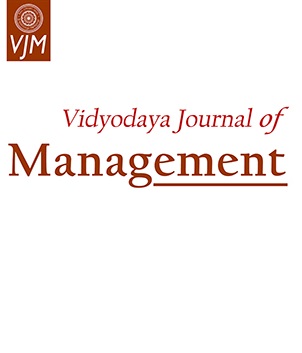Gender Identity Matters: Barriers to Employment Cycle of Transgender Individuals in the Labor Market of Sri Lanka
DOI:
https://doi.org/10.31357/vjm.v9iII.6586Abstract
Transgender individuals, a vulnerable community in Sri Lanka do not share the same economic opportunities in the labor market as cisgender individuals. This paper examines the barriers faced by transgender individuals in Sri Lanka during three stages of the employment cycle, namely the pre-working stage, the working stage, and the post-working stage. This qualitative study used snowball sampling to select a sample of 25 transgender participants in early adulthood (20–40 years). The in-depth interviews and participatory observations were the data collection methods used. Reflexive thematic analysis is employed for the data analysis with the use of the NVivo analytical tool. This study found that there is no free entry, free stay and free exit for transgender individuals in the Sri Lankan labor market. The labor entry at the pre-working stage is identified to be restricted by the employer’s prejudicial attitude at the selection phase, delays in labor entry due to the transition process, and fear of labor entry due to previous negative experiences. Further, this study recognized the absence of free stay during the working stage, mainly due to underemployment, the glass ceiling, hegemonic masculinity, and harassment and discrimination. Moreover, this research has revealed that transgender individuals’s freedom to exit their current job is suppressed by the uncertainty of receiving a new job at the post-working stage. In doing so, this study highlights the importance of having a trans-inclusive and equitable workplace policy in every organization.
Keywords: Labor Market Barriers, Qualitative Study, Sri Lanka, Transgender Individuals






